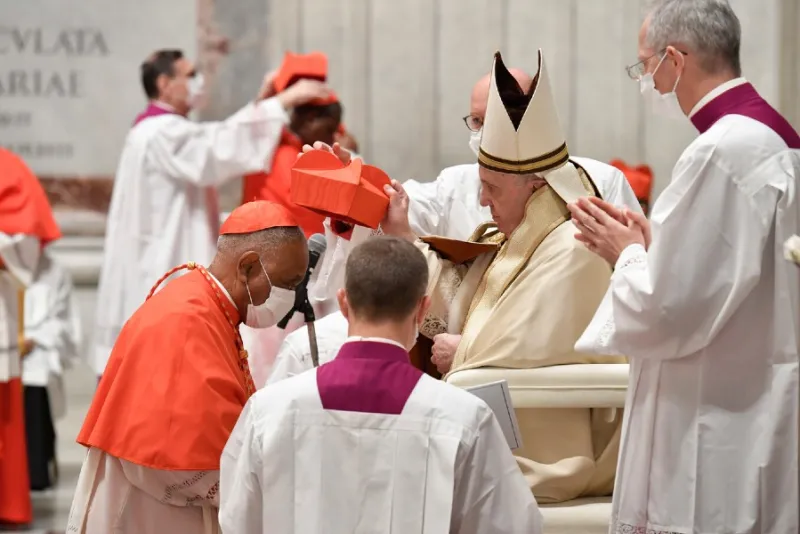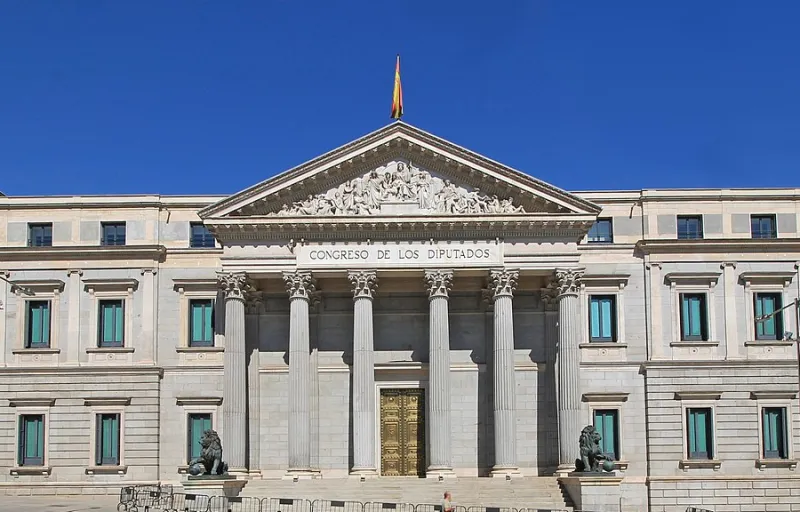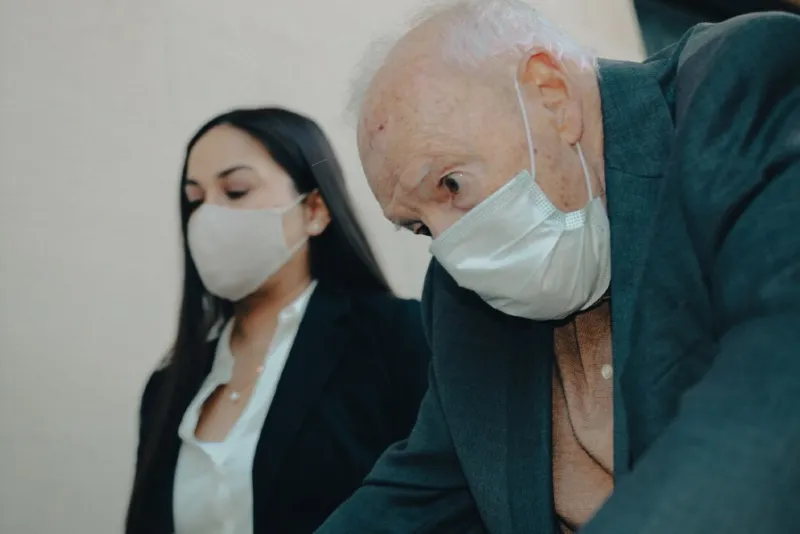 Cardinal Wilton Gregory receives the red hat from Pope Francis in St. Peter’s Basilica on Nov. 28, 2020. / Vatican Media/Catholic News Agency
Cardinal Wilton Gregory receives the red hat from Pope Francis in St. Peter’s Basilica on Nov. 28, 2020. / Vatican Media/Catholic News Agency
Washington D.C., Sep 9, 2021 / 15:02 pm (CNA).
The Archbishop of Washington on Wednesday said he was “embarrassed” at the charges of sex abuse recently filed against his predecessor, and emphasized that the Church’s primary concern in such cases should be caring for victims.
Addressing a National Press Club luncheon on Wednesday, Cardinal Wilton Gregory answered questions on a wide range of issues including the clergy sex abuse crisis, COVID-19 vaccines, and becoming the first African-American cardinal in the United States.
The former archbishop of Washington, Theodore McCarrick, last week pleaded not guilty in a Massachusetts court to criminal charges of sex assault against a 16 year-old male; the acts allegedly took place in the 1970s while McCarrick was a priest.
McCarrick, a former cardinal who retired as Washington archbishop in 2006, was laicized in 2019 following a Vatican investigation that found him guilty of “sins against the Sixth Commandment with minors and with adults” and solicitation in the confessional.
“I’m embarrassed,” Gregory said of his predecessor’s alleged acts. “I’m embarrassed not with the discovery – although that’s certainly a part of my embarrassment. But I’m embarrassed because it’s absolutely contrary to everything that I as a priest – my brother priests and bishops – should be pursuing, in terms of serving our people.”
“My first thought was about the people that he [McCarrick] had hurt,” Gregory said of seeing images of the 91-year-old McCarrick appearing at his Sept. 3 arraignment in Massachusetts.
From the beginning of the clerical sex abuse crisis, he said, the Church has been focused on the wrong questions – rather than on the victims.
“We’re trying to make sure that the proper attention is put in the proper place. The people who should get our sorrow and our concern and our compassion are those that were hurt,” Gregory insisted.
Gregory led the U.S. Conference of Catholic Bishops from 2001 to 2004, a tenure which included the 2002 revelations of widespread clergy sex abuse. The conference in the fall of 2002 drafted its response, the Dallas Charter, which established norms for dealing with alleged abuse by priests and deacons. McCarrick, then the archbishop of Washington, had a role in drafting the charter.
“We also took this position: that no one with a credible [abuse] allegation should ever be in public ministry,” Gregory said on Wednesday.
He added that bishops can only act on clergy abuse accusations that are credible, and that they have knowledge of.
“I can only act on that which I know,” he said.
Back in January, Cardinal Gregory delivered an invocation at a national memorial service for COVID-19 victims, held on the eve of President Biden’s inauguration.
Regarding Catholics who have “religious” concerns about taking COVID-19 vaccines, Gregory on Wednesday pointed to Pope Francis and Pope Emeritus Benedict XVI having both received a vaccine.
“It’s difficult to say that ‘I have a religious concern’ when the last two pontiffs have already been vaccinated, and where Pope Francis has so clearly, and may I say with great insistence, urged Catholics to take the vaccine,” Gregory said.
“It doesn’t diminish their concern, but it certainly puts their concern on a pretty shaky platform.”
Some Catholics have voiced objections to receiving the three COVID-19 vaccines approved for use in the United States. Two of the vaccines, produced by Pfizer and Moderna, have been tested with cell lines derived from abortions committed decades ago. The Johnson & Johnson vaccine was not only tested on the controversial cell lines, but was also produced using the cell lines.
The Vatican’s Congregation for the Doctrine of the Faith in December 2020 issued a note stating that Catholics may receive a COVID-19 vaccine with a connection to the cell lines, if no ethical option is available, due to the gravity of the pandemic.
For Catholics objecting out of “conscience,” they should take other precautions to prevent transmission of the virus, the Vatican stated.
On the topic of racial reconciliation, Gregory on Wednesday was asked by moderator Lisa Matthews, president of the National Press Club, what role the Church could play to bring Black Americans back to the faith.
Catholics “have a responsibility because of our faith to be on the forefront of the justice movement,” Gregory said. “It’s not something that should be foreign to any of us.”
He noted a generational decline in religious practice that is not unique to Catholicism.
“We have a problem – and it’s not just a Catholic problem,” he said, “of passing on the faith to the next generation.” For too many Catholics, he said, Catholicism “is a description rather than a practice or lived reality.”
Gregory also answered questions on immigration, labor, abortion, the death penalty, and the ordination of women.
He said that President Biden was “not demonstrating Catholic teaching” on when life begins, in response to Biden’s claim last week that life does not begin at conception. Gregory also called the death penalty “flawed,” before the Supreme Court on Wednesday stayed the execution of a Texas inmate.
Asked about the Church’s discipline on priestly celibacy and its connection to the clerical sex abuse crisis, Gregory said that celibacy is not the central problem at hand. Married priests, as well as married rabbis and ministers of other denominations have also abused children, he noted.
“The Catholic Church – we are the 800-pound gorilla. But we’ve got some other small relatives that have also demonstrated that same type of incredibly sick personality, behavior,” he said.
Reflecting on becoming the first Black cardinal in the United States in November 2020, Gregory pointed to his Chicago roots.
“Having been raised in an urban environment, like many African-American Catholics, the schools were a primary vehicle for entering the Catholic Church. And so it is with me,” Gregory said.
“When I knelt in front of Pope Francis to receive the biretta, the ring, and the sign, titular church – a lot of that heritage was running through my head at that time,” he recalled.
“We’ve had Italian cardinals, Polish cardinals, German cardinals, Irish cardinals. Now we have a Black cardinal. What is that going to do to the heart of the Church? What benefit will that bring to our Church? I’m still trying to figure that out.”

[…]







